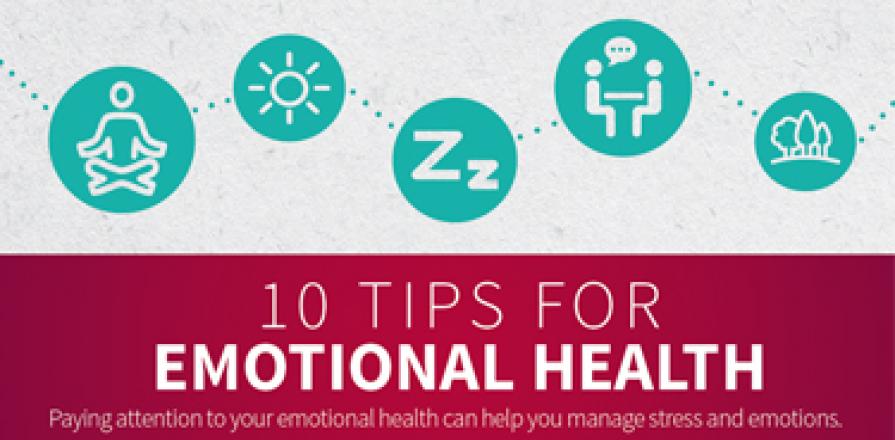10 Tips for Emotional Health
All of us have experienced anxiety, sadness, frustration or other negative emotions. While they can cause mental distress, they can also take a toll on your heart health, especially if these feelings are persistent or frequent.
Understanding and dealing with our moods is important for both preventing cardiovascular disease and for improving recovery. The Ottawa Heart Institute’s “10 Tips for Emotional Health” are designed to help.

PRACTICE DEEP BREATHING Breathe in deeply so that your belly expands as you inhale and deflates when you exhale. Deep breathing relaxes your body and lowers your blood pressure and heart rate.
NAME YOUR EMOTIONS Most of us are not aware of how we are feeling at any given moment. Naming your emotions lets you think about them more accurately and decide how you will react. Name it to tame it!
TRY NOT TO JUDGE YOUR EMOTIONS Emotions are normal. They let us know when something has happened and they prepare us to act. Judging our emotions can make them seem worse.
KNOW YOUR EMOTIONAL TRIGGERS What kinds of things make you angry? What makes you feel sad? Knowing your emotional triggers will help you be better prepared when those emotions arise.
KNOW YOUR EMOTIONAL TRIGGERS What kinds of things make you angry? What makes you feel sad? Knowing your emotional triggers will help you be better prepared when those emotions arise.
MOVE YOUR BODY Physical activity decreases anxiety and improves mood and self-esteem. Just going for a walk can make a difference.
TALK TO SOMEONE YOU CARE ABOUT Telling others how you feel can help you sort through your feelings, relieve tension, and feel supported. Humans are social! Make time to talk and connect with others.
SLEEP WELL Sleep is important for your mind and body. Go to bed when you are tired and avoid doing things before bed that might keep you up, such as having caffeine or exercising too late at night.
STOP “SHOULDS” IN THEIR TRACKS You put a lot of pressure on yourself when you say “I should exercise more” or “I shouldn’t have eaten that.” Try being nicer to yourself…Say “I ate a less healthy meal today because I was tired.”
DO THE THINGS THAT MAKE YOU HAPPY People have all kinds of ways that they cope with emotions. Some people read, spend time with friends, or go to the movies. Identify the things that make you happy and make time for them.
